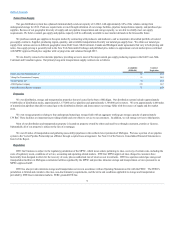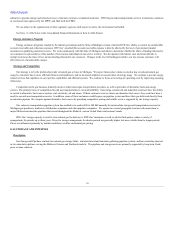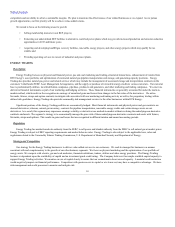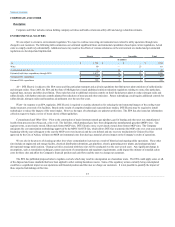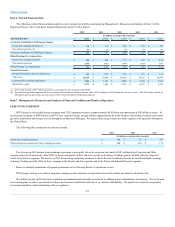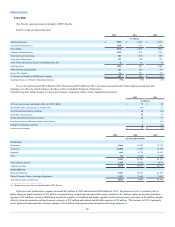DTE Energy 2012 Annual Report Download - page 21
Download and view the complete annual report
Please find page 21 of the 2012 DTE Energy annual report below. You can navigate through the pages in the report by either clicking on the pages listed below, or by using the keyword search tool below to find specific information within the annual report.
Table of Contents
current Michigan legislation we will be required in the future to provide a specified percentage of our power from Michigan renewable energy sources. We are
implementing a strategy for complying with the existing state legislation, but we do not know what requirements may be added by federal legislation. In
addition, there could be additional state requirements increasing the percentage of power required to be provided by renewable energy sources. We are actively
engaged in developing renewable energy projects and identifying third party projects in which we can invest. We cannot predict the financial impact or costs
associated with these future projects.
We are also required by Michigan legislation to implement energy efficiency measures and provide energy efficiency customer awareness and education
programs. These requirements necessitate expenditures and implementation of these programs creates the risk of reducing our revenues as customers decrease
their energy usage. We do not know how these programs will impact our business and future operating results.
Regional and national economic conditions can have an unfavorable impact on us. Our utility and non-utility businesses follow the economic cycles
of the customers we serve and credit risk of counterparties we do business with. Should national or regional economic conditions deteriorate, reduced volumes
of electricity and gas, and demand for energy services we supply, collections of accounts receivable, reductions in federal and state energy assistance funding,
and potentially higher levels of lost gas or stolen gas and electricity could result in decreased earnings and cash flow.
Threats of terrorism or cyber attacks could affect our business. We may be threatened by problems such as computer viruses or terrorism that may
disrupt our operations and could harm our operating results. Our industry requires the continued operation of sophisticated information technology systems
and network infrastructure. Despite our implementation of security measures, all of our technology systems are vulnerable to disability or failures due to
hacking, viruses, acts of war or terrorism and other causes. If our information technology systems were to fail and we were unable to recover in a timely way,
we might be unable to fulfill critical business functions, which could have a material adverse effect on our business, operating results, and financial
condition.
In addition, our generation plants, gas pipeline and storage facilities and electrical distribution facilities in particular may be targets of terrorist activities that
could disrupt our ability to produce or distribute some portion of our energy products. We have increased security as a result of past events and we may be
required by our regulators or by the future terrorist threat environment to make investments in security that we cannot currently predict.
Failure to maintain the security of personally identifiable information could adversely affect us. In connection with our business we collect and retain
personally identifiable information of our customers, shareholders and employees. Our customers, shareholders and employees expect that we will adequately
protect their personal information, and the United States regulatory environment surrounding information security and privacy is increasingly demanding. A
significant theft, loss or fraudulent use of customer, shareholder, employee or DTE Energy data by cybercrime or otherwise could adversely impact our
reputation and could result in significant costs, fines and litigation.
Failure to retain and attract key executive officers and other skilled professional and technical employees could have an adverse effect on our
operations. Our business is dependent on our ability to recruit, retain, and motivate employees. Competition for skilled employees in some areas is high and
the inability to retain and attract these employees could adversely affect our business and future operating results.
A work interruption may adversely affect us. Unions represent approximately 4,900 of our employees. Our contracts with several bargaining units for
the majority of our represented employees are due to expire in June and October 2013. We cannot predict the outcome of those negotiations. A union choosing to
strike would have an impact on our business. We are unable to predict the effect a work stoppage would have on our costs of operation and financial
performance.
If our goodwill becomes impaired, we may be required to record a charge to earnings. We annually review the carrying value of goodwill associated
with acquisitions made by the Company for impairment. Factors that may be considered for purposes of this analysis include any change in circumstances
indicating that the carrying value of our goodwill may not be recoverable such as a decline in stock price and market capitalization, future cash flows, and
slower growth rates in our industry. We cannot predict the timing, strength or duration of any economic slowdown or subsequent recovery, worldwide or in the
economy or markets in which we operate; however, when events or changes in circumstances indicate that the carrying value of these assets may not be
recoverable, the Company may take a non-cash impairment charge, which could potentially materially impact our results of operations and financial position.
We may not be fully covered by insurance. We have a comprehensive insurance program in place to provide coverage for various types of risks,
including catastrophic damage as a result of acts of God, terrorism or a combination of other significant
19


